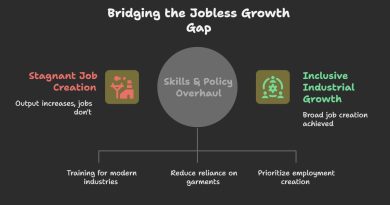Poverty in Bangladesh has surged sharply, with 27.93 per cent of citizens now living below the poverty line—up from 18.7 per cent in 2022—according to a new national survey by the Power and Participation Research Centre (PPRC).
Extreme poverty has also worsened, rising to 9.35 per cent from 5.6 per cent just three years ago. The findings were unveiled Monday at a dissemination event in Dhaka, commissioned by the finance ministry and based on 8,067 households across all 64 districts.
“This is not just about poverty returning—it’s about multiplying vulnerabilities,” said PPRC Executive Chairman Dr Hossain Zillur Rahman. “Focusing only on macroeconomics is not enough; we must look at people’s wellbeing, ground realities, and equitable allocation.”
Rural hardest hit, middle class under strain
The survey found rural Bangladesh bearing the brunt, with 31.6 per cent of households below the poverty line compared to 19.7 per cent in urban areas. The middle class is increasingly fragile, with families reporting dwindling savings, rising debt, and painful trade-offs in education spending.
“The poor are not just poor in income—they are poor in resilience,” Dr Rahman noted.
More than half of households (51.3 per cent) have at least one member suffering from chronic illness, while female-headed families remain disproportionately disadvantaged. The bottom 40 per cent of households carry debt at least twice the size of their savings, highlighting widespread financial fragility.
Food insecurity is acute: 12 per cent of the poorest reported skipping meals in the past week, while 9 per cent went an entire day without food.
Inequality at record high
The national expenditure Gini coefficient—a key measure of inequality—jumped to 0.436 in 2025 from 0.334 in 2022. Urban inequality is even starker, with the Gini index at 0.532.
“The steep rise in inequality in just three years is deeply concerning and underscores a recovery skewed towards the better-off,” Dr Rahman warned.
Employment: the central fault line
While just over half of adults reported some form of work, 37.7 per cent were underemployed, working fewer than 40 hours a week. Women remain disproportionately affected: 65.5 per cent are underemployed, while female labour force participation remains stuck at 25.5 per cent. Nearly half of workers are self-employed, reflecting both resilience and precarity.
Fragile resilience amid hardship
Despite widespread distress, signs of adaptation remain. Around 15 per cent of households receive remittances averaging Tk 29,762 per month, though mostly among higher-income groups. Smartphone penetration has reached 74 per cent, rising to 80 per cent in youth households. Nearly half of families have shifted to cylinder gas use to cope with rising costs.
The domestic consumer market is now valued at US$211 billion, reflecting untapped potential even amid hardship. But Dr Rahman cautioned: “People are coping, but these are fragile adaptations, not substitutes for structural policy action.”
Harassment a daily burden
The report highlighted harassment—locally termed hoirani—as a persistent household burden. Nearly half of families reported negative experiences in health services, 42 per cent in markets, and significant shares in schools, workplaces, and government offices.
Although reported bribe payments have declined since August 2024, harassment remains widespread. Police accounted for 39.4 per cent of reported bribe recipients, followed by political activists. “A bribe may be Tk 10, but the week lost in delays and hassles costs much more,” the report observed.
National mood divided
One year after the July Uprising, optimism remains sharply divided by class. While 62 per cent of wealthier households said they were hopeful about the future, only 17.7 per cent of the poorest shared that sentiment. Overall, however, 54 per cent of families described themselves as at least “somewhat optimistic.”
High prices were identified as the top concern (69.6 per cent), followed by corruption (55.9 per cent) and governance failures (52 per cent). Across income groups, aspirations converged on education, secure jobs, good health, and a corruption-free society.
Policy recommendations
The PPRC urged immediate measures, including an emergency family assistance package, education continuity grants, expanded open market sales of essentials, and a new safety net for families facing chronic illness burdens.
Medium-term steps include participatory policymaking, transparent reform reporting, and forming a Household Resilience Task Force. Longer-term reforms would establish a Household Economic Monitoring Cell under the Bangladesh Bureau of Statistics, ensure equitable regional allocation, and embed a “people’s lens” in national planning.
“Strengthening economic democracy begins when we put the people’s lens at the heart of policymaking,” Dr Rahman stressed. “The challenge is not GDP growth alone. The challenge is whether the economy delivers equity, resilience, and dignity for its citizens.”






